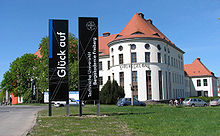Technical University of Bergakademie Freiberg
 | |
| Motto | The University of Resources |
|---|---|
| Established | 1765 |
| Chancellor | Jens Then |
| President | Klaus-Dieter Barbknecht |
| Students | 4,294 (WS 2017/18)[1] |
| Location | Freiberg , |
| Website | tu-freiberg.de |

The Technische Universität Bergakademie Freiberg is one of the top public German university of technology with about 4,300 students in the city of Freiberg, Saxony.The 2021 QS World University Rankings by subject rated TU Bergakademie Freiberg No. 17 for Mineral and Mining worldwide and No. 3 in within Europe. The Center for World University Rankings (CWUR) lists TU Freiberg in 2020 on rank 64 among German universities concerning research performance. Established in 1765 by Prince Franz Xaver, regent of Saxony, based on plans by Friedrich Wilhelm von Oppel and Friedrich Anton von Heynitz, it is the oldest university of mining and metallurgy in the world. The chemical elements indium (1863) and germanium (1886) were discovered by scientists of Freiberg University. The polymath Alexander von Humboldt studied mining at the Bergakademie from 1791 to 1792, as did the poet Novalis from 1797 to 1799.
Today, TU Bergakademie Freiberg is a highly specialized university of technology comprising six faculties: mathematics and informatics; chemistry, biology and physics; geoscience, geoengineering and mining; mechanical engineering; material sciences; and economics.
Programs[]
The university offers programs taught in German as well as international programs entirely taught in English. Admission to all programs from Bachelor through PhD is performance-based and without tuition fees (as usual for consecutive studies at German public universities); students only pay a registration fee of about €94 per semester.
English-language programs include the master's programs in:
- Sustainable and Innovative Natural Resource Management SINReM
- Advanced Mineral Resources Development
- Groundwater Management
- Sustainable Mining and Remediation Management
- Computational Materials Science
- Computational Science and Engineering
- Mechanical and Process Engineering
- Metallic Materials Technology
- International Business in Developing and Emerging Markets – IBDEM
Freiberg University of Mining and Technology has been ranked among the best universities worldwide for mining engineering.[2]
Though a public university, it has a relatively large private endowment. The university is home to one of the largest German university foundations.[3]
Student body[]
Freiberg is a highly international university. Among its 4,061 students in 2018, 24% were foreign students. There are double degree agreements with universities in China, France, Ghana, Italy, Poland, Russia, Thailand and others. About 30% of the doctoral degrees awarded by the university are given to foreign students.[1]
Notable alumni[]
Mary Hegeler Carus – first woman to legally enroll in 1885.[4]
References[]
- ^ Jump up to: a b "Kennzahlen und Rankings | TU Bergakademie Freiberg". tu-freiberg.de.
- ^ QS World University Rankings, 2017. https://www.topuniversities.com/university-rankings/university-subject-rankings/2017/engineering-mineral-mining. Retrieved 11 October 2017.
- ^ Michael Bartsch: Geldsegen für Freiberg. taz, 24. Januar 2007, abgerufen am 11. August 2009.
- ^ "Breaking Boundaries Abroad · The Life of Mary Hegeler Carus · SCRC Virtual Museum at Southern Illinois University's Morris Library". scrcexhibits.omeka.net. Retrieved 2021-03-19.
External links[]
- Website of the Freiberg University of Mining and Technology (German)
- Website of the International Center 'Alexander von Humboldt'
Coordinates: 50°55′05″N 13°20′27″E / 50.91806°N 13.34083°E
- Freiberg University of Mining and Technology
- Schools of mines
- Educational institutions established in 1765
- 1765 establishments in the Holy Roman Empire
- Freiberg
- Mining in the Ore Mountains
- Germany university stubs
- Ore Mountains stubs
- Saxony building and structure stubs

